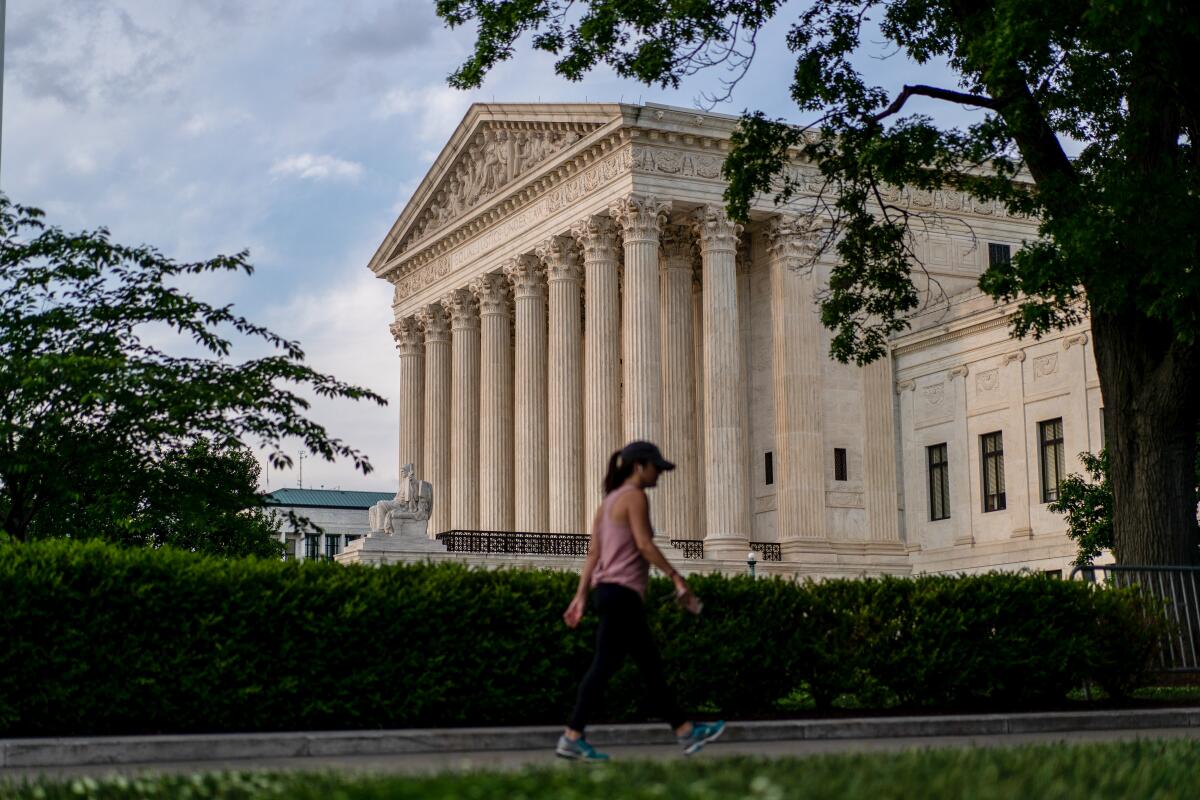Supreme Court rejects bond hearings for immigrants facing deportation

- Share via
WASHINGTON — The Supreme Court ruled Monday that immigrants being held for deportation have no right to seek their release on bond, regardless of how long they may be held.
The justices ruled unanimously that federal immigration law calls for holding noncitizens who returned illegally to the United States and generally “removing” them within 90 days. They may be detained longer if they have pending claims, the court said, but they do not have a right under the law to go free on bond.
“There is no plausible construction of the text of [immigration law] that requires the government to provide bond hearings before immigration judges after six months of detention,” said Justice Sonia Sotomayor, speaking for the court in Johnson vs. Arteaga-Martinez.
She said Antonio Arteaga-Martinez, a citizen of Mexico, had entered this country illegally four times and been sent back across the border.
He said he was beaten violently by a street gang in Mexico and fled north for safety. He was held in Pennsylvania for deportation but filed a claim for asylum.
After six months of detention, a federal judge and the 3rd Circuit Court of Appeals in Philadelphia ruled he could be released on bond.
In a second, related 6-3 decision, the high court Monday also overturned the 9th Circuit Court in San Francisco, which upheld broad, “class-wide injunctive relief” that required bond hearings for those who had been held for deportation for more than six months in Seattle and San Francisco.
The Biden administration appealed that ruling.
In overturning it, Justice Samuel A. Alito Jr. said a 1996 immigration law “bars class-wide relief” for noncitizens who are held by the government. He said federal judges are limited to deciding individual claims.
This time, Sotomayor dissented and said the ruling goes beyond bond hearings and will leave “lower federal courts powerless to issue classwide injunctive relief ... which will leave many vulnerable non-citizens unable to protect their rights.” Justices Elena Kagan and Stephen G. Breyer agreed.
In recent years, the more conservative court has consistently cut back on the power of judges to extend leniency to immigrants who are fighting deportation. The justices have done so by strictly interpreting provisions that Congress adopted in 1996.
At issue in the background of both cases was a 2001 decision in which the court said it would be unconstitutional to hold a noncitizen indefinitely with no hearing and no chance to be released on bond. Judges have regularly cited that ruling to justify bond hearings after six months.
ACLU lawyers who worked on the two cases said the two appeals courts had “rejected the government’s inhumane policy of endless detention.”
They said “denying bond hearings can have life-threatening consequences, especially given ICE’s [Immigration and Customs Enforcement] record of abuse, neglect, and death in its detention centers. And denying class actions would cut out the vast majority of people who do not have the representation needed to file individual cases.”
Matt Adams, legal director of the Northwest Immigrant Rights Project, said the court had turned its back on earlier rulings that called for hearings.
“To now find that the statute allows for indefinite detention is contrary to a fundamental principle upon which our system was founded — that government officials may not lock up a person without at least providing them their day in court to contest whether their confinement is justified,” Adams said.
Michael Kaufman, attorney for the ACLU in Los Angeles, pointed out that in both cases the court said it was ruling based on the immigration law, not the Constitution.
“While the ruling is a setback, we are pleased the court recognized that our clients could proceed with a constitutional challenge to their prolonged incarceration,” he said.
Breyer authored the 2001 opinion holding that the Constitution required hearings after six months. In the first ruling on Monday, he agreed with Sotomayor’s opinion on the law, but he dissented in part and said the Constitution called for a different outcome.
The two immigration decisions were among five handed down on Monday, leaving 24 cases still to be decided by the end of the term.
They include Biden vs. Texas, a major case testing whether the president and his administration must continue President Trump’s so-called “remain in Mexico” policy.
Under the Trump program, thousands of migrants from Central America have been barred from entering the United States when they apply for asylum. Instead, it requires them to wait on the Mexican side of the border until their asylum claims can be heard.
The court said more decisions will be announced on Wednesday.
More to Read
Get the L.A. Times Politics newsletter
Deeply reported insights into legislation, politics and policy from Sacramento, Washington and beyond. In your inbox three times per week.
You may occasionally receive promotional content from the Los Angeles Times.











